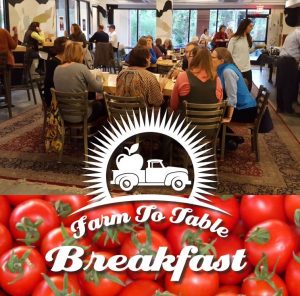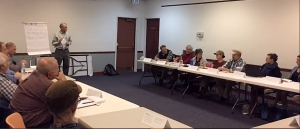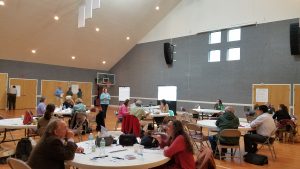You are invited to participate in a photo contest celebrating community, local, and regional food systems (CLRFS) In Virginia. The contest is sponsored by the Virginia Cooperative Extension (VCE) CLRFS Program Team.
There are four categories of photo opportunities which include:
- Freshness – Capture the value, unique freshness, and availability of local foods.
- Fun – Capture the joy and celebration of local foods.
- People – Show the diversity of people engaged throughout the local food system.
- Innovation – Illustrate innovations in growing, processing, marketing, distribution, access, and utilization of local foods.
- Prizes will be awarded for the overall best photo and the top photo in each category. For Overall Best Photo the prize is a 3-minute professional video of a local foods event of your choice with time and location to be arranged between the winner and Zeke Barlow, CALS Communications. The top photo in each category will receive a swag bag of assorted goodies collected from VCE and our partners.
In addition, the top three (3) photos in each category will be featured in a 2019 Virginia Community, Local, and Regional Food Systems Calendar to be distributed at the 2018 Farm-to-Table Conference; additional honorable mention photos may be included.
Photo submissions will be accepted June 1st through November 2nd from VCE employees and their community partners. Videos or video clips are welcome, but will not be eligible for the contest prizes.
GUIDELINES:
Submissions are open to VCE faculty and their partners in local food systems work. All photos submitted for the contest may be used in VCE and Virginia Tech marketing. All photos must be of events/activities located in Virginia and the submitting person must have the right to share the photo. Photos must be submitted between June 1st and November 2nd, 2018. Each participant may submit up to three (3) images for the contest. However, additional images are welcome.
Images should be of high quality, in focus and of the highest resolution possible, which usually means the original size. Set your camera or phone for the largest file format.
All submissions must include a caption that includes:
- Name of the photographer
- The locality (VCE unit and/or location of photo)
- Names of identifiable people (media releases must be kept by the VCE faculty; clients may defer from having their names used in the caption). For more information on media releases and a media release form, visit https://www.communications.cals.vt.edu/resources/media-release.html.
- Name/description of the event/activity
- Two contest tags:
- the campaign name – #LocalFoodMatters and,
- the category to which your photo is being submitted using #LocalFoodLooksLike(name of photo category). Category names are Freshness, Fun, People, and Innovations.
Submissions for the photo contest is a 2-step process:
- Post your submissions to the CLRFS Facebook page at https://www.facebook.com/VACLRFS/
- Upload your image and caption files (use same name for both files) to the CLRFS Google drive at https://drive.google.com/drive/folders/1J9erfT-LWCb_RvbASXvTH4LDPzNq8oPt?usp=sharing If you have any trouble accessing the Google drive, send your photo and caption by email to CLRFSphotocontest@vt.edu
VCE agents are asked to encourage their community partners to participate in VCE photos and to submit their own photos of local foods activities. Photos showing cooperation and collaboration between VCE and community groups are especially encouraged. The attached flier may be shared with community partners to assist them in submitting their photos for the contest.
JUDGING CRITERIA:
For contest consideration, photos must be submitted to both the CLRFS Facebook page and the CLRFS Google drive between June 1 and November 2, 2018. Winners will be notified by November 20th.
Photo scoring will be based on quality, resolution, creativity/originality, fit with program theme and/or category, and overall impact.
NOTES:
Submitted photos will be posted on the Facebook page at our discretion to provide a range of photo topics over any given time. Images will also be shared on the CLRFS Instagram account.
We reserve the right to eliminate images considered inappropriate or not owned by the submitting party, and to change the category of submission of any photo. Images submitted without a complete caption will be disqualified.
Video clips may be submitted to the google drive. Although not part of the contest, we are seeking clips for the creation of videos for promotion and marketing of community, local, and regional food systems. Please submit with the requested caption information.
If you have any problems, contact us on Facebook or email CLRFSPhotoContest@vt.edu.








